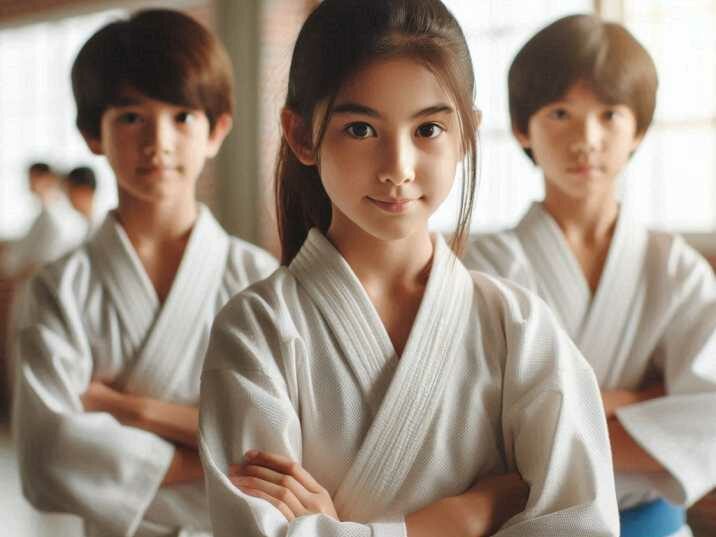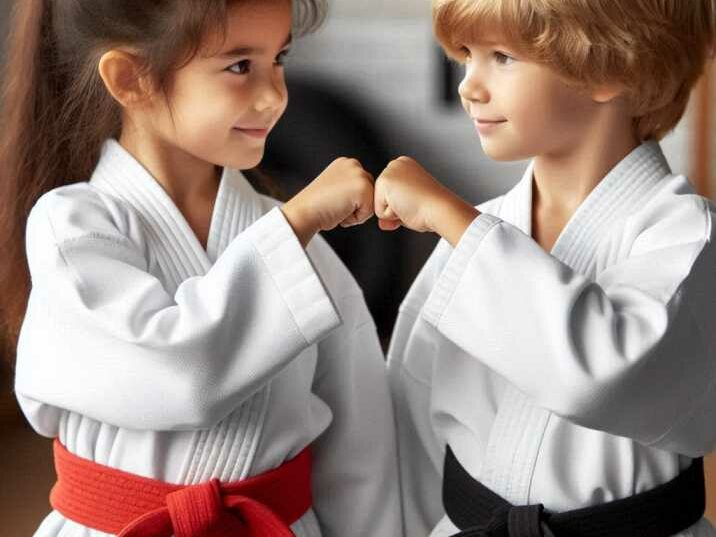Team Spirit: The Social Benefits of Martial Arts for Kids
Introduction:
Table of Contents
In a world where individualism often takes the spotlight, fostering a sense of teamwork and camaraderie in children is paramount. Martial arts, beyond its physical aspects, serves as a nurturing ground for team spirit and social skills development. From fostering friendships to instilling discipline, the social benefits of martial arts for kids are as profound as they are invaluable.

The Power of Team Spirit and Social Benefits of Martial Arts for Kids:
Martial arts training goes beyond the dojo’s walls; it extends to shaping character and forging bonds among peers. Here’s how:
1. Building Stronger Connections:
Martial arts classes provide a conducive environment for children to form lasting friendships. Through shared experiences and mutual goals, kids learn to trust, support, and rely on one another, fostering a sense of belonging and camaraderie.
2. Cultivating Collaboration:
Teamwork lies at the core of martial arts practice. Whether performing synchronized movements in a kata or participating in group drills, children learn the importance of working together towards a common objective. This collaborative spirit translates seamlessly into other areas of their lives, such as academics and extracurricular activities.
3. Nurturing Leadership Skills:
Within a martial arts setting, children are encouraged to take on leadership roles, whether as team captains during sparring sessions or mentors to younger practitioners. These opportunities allow them to develop vital leadership qualities such as responsibility, empathy, and effective communication.
4. Fostering Respect and Empathy:
Respect for oneself and others is a cornerstone of martial arts philosophy. Through structured training and interactions with instructors and fellow students, children learn to appreciate diversity, practice empathy, and treat others with kindness and respect.
5. Embracing Diversity:
Martial arts classes often comprise students from various backgrounds, ages, and skill levels. This diversity fosters an inclusive environment where children learn to appreciate differences, celebrate individual strengths, and support one another’s growth.
The Role of Instructors in Nurturing Team Spirit
Behind every successful martial arts class is a dedicated instructor who serves as a mentor, guide, and role model for their students. Here’s how instructors contribute to fostering team spirit:
1. Leading by Example:
Instructors set the tone for teamwork and camaraderie through their actions and demeanor. By demonstrating respect, cooperation, and encouragement, they inspire students to embody these qualities in their interactions with others.
2. Facilitating Collaboration:
Instructors design training sessions that encourage collaboration and teamwork, such as partner drills, group exercises, and team-building activities. Through these experiences, children learn to communicate effectively, support their peers, and overcome challenges together.
3. Providing Constructive Feedback:
Effective instructors offer feedback that is constructive, specific, and encouraging. By highlighting individual and team accomplishments and addressing areas for improvement with positivity and patience, they motivate students to strive for excellence while fostering a supportive learning environment.
4. Instilling Values:
Beyond physical techniques, instructors impart martial arts values such as integrity, perseverance, and humility. By emphasizing the importance of these principles both on and off the mat, they help students develop into respectful, responsible, and resilient individuals.

Table of Information:
| Social Benefits of Martial Arts for Kids | |
|---|---|
| Building Stronger Connections | Forming lasting friendships and fostering a sense of belonging |
| Cultivating Collaboration | Learning the importance of teamwork and cooperation |
| Nurturing Leadership Skills | Developing qualities such as responsibility and empathy |
| Fostering Respect and Empathy | Embracing diversity and treating others with kindness |
| Embracing Diversity | Celebrating individual strengths and supporting growth |
Conclusion:
In a society that often glorifies individual achievement, martial arts stands out as a beacon of team spirit and collaboration. Through structured training, positive mentorship, and shared experiences, children not only hone their physical skills but also cultivate essential social skills that will serve them well throughout their lives. By embracing the values of respect, cooperation, and empathy, martial arts empowers children to thrive as part of a supportive community, both inside and outside the dojo.
FAQs:
Q1: Can children of all ages participate in martial arts classes?
A1: Yes, martial arts classes are typically available for children as young as three years old, with programs tailored to different age groups and skill levels.
Q2: Will my child learn self-defense techniques in martial arts classes?
A2: Yes, martial arts training emphasizes self-defense techniques alongside physical fitness, discipline, and character development.
Q3: How can martial arts help improve my child’s focus and concentration?
A3: Through structured training and repetitive practice, martial arts instills discipline, focus, and concentration in children, which can benefit their academic performance and daily life.
Q4: Are martial arts classes safe for children?
A4: Yes, reputable martial arts schools prioritize safety and provide proper supervision, equipment, and instruction to ensure a safe learning environment for children.
Q5: How can I find a reputable martial arts school for my child?
A5: Research local martial arts schools, read reviews, and visit potential facilities to observe classes, meet instructors, and assess the suitability of the program for your child’s needs and preferences.


